THE HOLY SPIRIT OF GOD
Power or Person?
Many men and women who have read the Bible and listened to Christian teachers have been puzzled about the Holy Spirit. Who or what is the Holy Spirit? Is the Holy Spirit a God, or a part of God? What is the truth?
been puzzled about the Holy Spirit. Who or what is the Holy Spirit? Is the Holy Spirit a God, or a part of God? What is the truth?
In order to answer these questions, we will turn to the Bible itself as the only authority. Please turn to the Bible passages mentioned in this booklet to confirm the truth about the Holy Spirit for yourself.
Not a Mystery
When questioned about the Holy Spirit, many religious teachers today reply that it is a mystery, and that we should not seek to understand in detail what it means. They will often say that believers must accept their explanations, ‘in faith’, without requiring a logical explanation.
This is just an excuse. Comments like this overlook the passages in the Bible which show that the mystery of God has already been revealed through the work of Jesus Christ:
“Having made known to us the mystery of His will, according to His good pleasure” (Ephesians 1 :9)
“The mystery. ..now made manifest, and by the prophetic Scriptures made known to all nations” (Romans 16:25-26)
“The mystery which… has now been revealed to his saints.” (Colossians 1 :26)
These are not, the only Bible passages which show that the ‘mysteries’ of religion have now been revealed (see also Romans 11 :25; Ephesians 3:3; 6: 19; Colossians 4:3; 1 Corinthians 15:51). If the Bible repeatedly says that now there is no ‘mystery’ in the fundamental teachings of the gospel, then we can be confident that the truth about the Holy Spirit also can be found in the Bible, if we read through it and look for ourselves.
Never did any disciple of Jesus say, “this is a mystery, so do not try to understand it”. Instead they took pains to show their hearers logical explanations of the things from the Bible.
The Spirit of God
Many times throughout the Bible, the word ‘spirit’ is referred to as “the spirit of God”. The very beginning of the Bible says that “the spirit of God was moving over the waters” (Genesis 1:2) as God was about to create everything on earth.
The spirit spoken about in the Bible is of God. It is God’s spirit, something that belongs to him, and comes from him. That is why the phrase “the spirit of the Lord” appears so many times in the Bible. (For example Isaiah 11:2, 40:7, 61:1; Micah 3:8).
The spirit of God summarises many things about him. The Hebrew word (ruakh) translated “spirit” in the Old Testament of the Bible in the first sense means “breath” or “power”. God’s spirit is therefore His “breathing”, the very essence of God, reflecting His mind.
God’s actions are reflected in how He thinks, much like with us as human beings. In the Bible man’s spirit shows how he is. We think of something, and then do it. For example, our ‘spirit’, or mind, responds to the hunger in our stomach, and we will seek out some food. This explains why the Hebrew word for spirit can mean all of these English words: breath, mind, and power. Our spirit – the essential us – refers to our thoughts, and therefore also to our actions which reflect the thoughts or disposition of our mind.
On a far more glorious scale, God’s spirit is the same; it is the power by which He displays His essential being, His character and purpose. God thinks and therefore does things: “Surely as I have thought, so it shall come to pass, and as I have purposed, so it shall stand” (Isaiah 14:24).
The Limitless Power of God
God is all powerful. He is the creator of the world. In contrast to other so-called gods worshipped throughout the ages, the God of the Bible is the only true God.
“The Lord is the true God; He is the living God and the everlasting king. He has made the earth by his power, He has established the world by His wisdom.” (Jeremiah 10:10-12)
God used His power from the very beginning, when He created the world and everything in it. God continues to be in control of the world by this same power which was used to create people and animals.
“I have made the earth, the man and the beast that are on. the ground, by my great power and by my outstretched arm, and have given it to whom it seemed proper unto me.” (Jeremiah 27:5)
Because God by His very nature is powerful, His spirit is powerful. We as human beings have some power, but ours of course is limited. We have the power to carry out only some of the actions that we desire. God has an ability that we do not. He can give His power to human beings.
“He gives power to the weak, and to those who have no might He increases strength” (Isaiah 40:29).
Sometimes, this gift of power is called the spirit.
Power and Spirit
God’s power or spirit given to one of His prophets is spoken about in the following way:
“But truly I am full of power by the spirit of the Lord, and of justice and of might” (Micah 3:8)
The spirit gave power to the prophet Micah as he spoke God’s word. Many others in the Bible received power to do various miracles, or to show signs to people that God was with them.
Greatest of all, Jesus Christ received power from God, the Holy Spirit, to accomplish good things.
“God anointed Jesus of Nazareth with the Holy Spirit and with power, who went about doing good and healing all who were oppressed by the devil, for God was with him.” (Acts 10:38)
This power was a gift of God to His son, Jesus Christ. The power was the Holy Spirit.
The above passage speaks of Jesus being anointed with the Holy Spirit. Earlier on in the Bible, the time when the Holy Spirit was given to Jesus is described. This was just before Jesus began to preach. John the Baptist baptized him in the Jordan River. Immediately afterwards, the Holy Spirit came upon Jesus, as God spoke in the following words.
“You are my beloved son; in. you I am well pleased.” (see Luke 3:21-22)
The power of the Holy Spirit was at work in the life of Jesus even before this. Before he was born, an angel of God appeared to Mary his mother. The angel told her that she would have a special son, who would be called the Son of God. When Mary asked her how this would be, since she was a virgin, the angel replied:
“The Holy Spirit will come upon you, and the power of the Highest will overshadow you; therefore, also, that holy one who is to be born will be called the Son of God.” (Luke 1:35)
The miracle of the birth of Jesus was brought about by God’s power, called in this verse “the power of the highest”, and also revealed as the Holy Spirit.
Jesus Christ is never called “the son of the Holy Spirit”, in the Bible, he is only known as the ‘Son of Man’ (by Mary), or ‘Son of God’, because it was God’s Holy Spirit that worked the marvel of his birth. It was God’s desire that a son be born; therefore He carried it out by His spirit.
What is Spirit?
As we have said, “spirit” is more than God’s power. It is a part of God, just as air in the lungs is a part of human beings.
Jesus explained:
“God is spirit, and those who worship Him must worship in spirit and truth.” (John 4:24).
Spirit in the Bible is also associated with God’s mind, and His thinking, and the words that proceed from him.
“Who has directed the spirit of the Lord, or as His counsellor has taught him”, (Isaiah 40:13).
Later, in the New Testament, the apostle Paul quoted these words as follows:
“Who has known the mind of the Lord? Or who has become His counsellor?” (Romans 11:34)
God’s mind and His word have great power. What He proposes to do in His mind, and the words of His mouth, always come to pass. In the beginning, God said, “let there be light.” (Genesis 1:3). We do not understand how God accomplishes this, but we can see what was done. The Bible uses the same Hebrew word (ruakh) ‘spirit’ or ‘breath’ in the sense of “mind” when Abraham’s son Isaac, and his wife Rebekah were unhappy with Esau their son because he did things they did not approve of.
‘They were a grief of mind to Isaac and Rebekah” (Genesis 26:35).
Again “mind” is the same Hebrew word (ruakh) ordinarily translated as “spirit’, “breath” or “wind” in the Old Testament. There is also an association in the Bible between God speaking and His spirit. When God speaks, it is done. His words have power.
“By the word of the Lord the heavens were made, and all the host of them by the breath of His mouth… For He spoke, and it was done, He commanded, and it stood fast.” (Psalm 33:6,9).
The word “breath” above is the same word in the original language that is often translated “spirit” in English. God’s words have power, and whatever He says is done. The same word is also related to the words “wind” or “breeze”, as well as “breath”, as we have seen before. The Bible says that Adam and Eve heard the voice of God in “the cool of the day.” (Genesis 3:8) Again the word “cool” in the original is the same as the word for “spirit”. It was the time of the day when there was a wind or breeze running through the garden. God’s spirit is like wind. We cannot see it, but we can see its effects. The wind blows through the trees, and we see the leaves blow, though we do not see the wind. God acts in the earth, and we see His power in what He brings to pass.
The word used for spirit is translated as “breath” or “wind” in a number of Bible passages. (For example Genesis 7:15; Exodus 10:13,19; Numbers 11 :31; 2 Samuel 22:16; 1 Kings 18:45; 19:11; Job 4:9)
Church Teaching about the Holy Spirit
Many Christian churches and leaders today say that the Holy Spirit is a person -one of the persons of what they call the Trinity -composed of the Father, the Son and the Holy Spirit, This term is not found in the Bible, and was a teaching introduced into the church only 300 years after Christ.
.If this teaching is true, then we must find it clearly taught in the Bible, God’s word, The Bible should be our only authority. Although the terms “Trinity” and “God the Holy Spirit” are never found in the Bible, there are some passages which have been taken as supporting this teaching, Let us examine some of these to see for ourselves.
(1) “The Holy Ghost”
In the King James Bible the holy spirit is sometimes called “the Holy Ghost”, Surely a ghost must be a person? In fact this is just antiquated English -no modern Bible has this translation.
(2) Capital letter ‘S’ for “Spirit”
Another common misunderstanding is the capital letter “S”, often used in English Bibles with the word “Spirit”, Usually in English a capital letter means that what is referred to is a person (for example capital ‘J’ for John), But in the Bible this only reflects the fact that Bible translations are generally sponsored by churches which teach the Trinity -and naturally therefore those churches wish their translations to reflect this belief. But in the original languages of the Bible such a distinction is entirely lacking.
(3) ‘He’ and ‘who’
Another reason, in English Bibles, why people think that the Holy Spirit is a person is because in modern versions (such as NIV or NKJV) the “it” referring to the Holy Spirit in older versions has been changed to “he”. Likewise in many modern Bible versions “the Holy Spirit which” (a power) becomes “the Holy Spirit who” (a person). As with the capital letter ‘S’, such a distinction is unknown in the original Bible languages.
The Greek words that the translators have rendered as “he” or “who” in English versions are not necessarily used for a person in the original language. These words can also be translated as “it” and “which” as well. The choice of “he” or “it” should be determined by Bible teaching on God’s spirit.
(4) Grieving the spirit
There is one passage in particular in the Bible that has suggested to many people that God and His Spirit are separate, and which speaks of “grieving” the Holy Spirit. How, it is asked, can the spirit be grieved if it is not a person? Firstly it should be noted that the passage does not just say “the Holy Spirit’ but “the holy Spirit of God”:
“And do not grieve the holy Spirit of God” (Ephesians 4:30)
This is normal Bible language. Compare a similar statement:
“I Daniel was grieved in my spirit” (Daniel 7: 15)
This does not mean that Daniel, and his spirit, were separate persons. It only tells us that Daniel was grieved in his heart, or mind. The same is true of God being grieved in His spirit.
(5) The Elders in Ephesus
The apostle Paul helped establish new congregations of Christian believers on His missionary journeys. Elders were appointed to take responsibility for organising and serving each group of believers. Speaking to one of these groups of elders, Paul said:
“Therefore take heed to yourselves and to all the flock, among which the Holy Spirit has made you overseers to shepherd the church of God which he purchased with His own blood.” (Acts 20:28)
Did the Holy Spirit as a person make these elders overseers? Or was it God’s power -the Holy Spirit –upon those people who appointed the elders? Turning to the Bible for our answer, we find that:
“when they (Paul and Barnabas) had appointed elders in every church, and prayed with fasting, they commended them to the Lord”. (Acts 14:23)
It was Paul himself who had appointed them, aided by God’s power of the Holy Spirit in the selection. Again, when the same apostle Paul wrote to Titus he instructed,
“for this reason I left you in Crete, that you should set in order the things that are lacking, and appoint elders in every city as I commanded you.” (Titus 1:5)
Therefore, it was not the Holy Spirit as a person that appointed overseers, it was the apostles and leaders of the early Church who did so, aided by the gift of God’s power, the Holy Spirit.
Another example of a Bible passage that appears to speak as if the Holy Spirit is a person is when it was prophesied that the apostle Paul would be arrested:
“As we stayed many days, a certain prophet named Agabus came down from Judea. When he had come to us, he took Paul’s belt, bound his own hands and feet, and said, ‘Thus says the Holy Spirit, So shall the Jews at Jerusalem bind the man who owns this belt, and deliver him into the hands of the Gentiles.'” (Acts 21:10-11)
Was it the Holy Spirit as a person who made the pronouncement that this would happen, or was it God’s power of the Holy Spirit that gave the knowledge to the prophet to say these things?
(6) “Sent from God”
The Holy Spirit is often shown in the Bible to be sent from heaven. It is certainly true that the prophets did not speak their own words. They spoke the words of God. The Holy Spirit was sent from heaven as the power that gave them the words of God.
Consider the following:
“To them (the prophets) it was revealed that, not to themselves, but to us they were ministering the things which have been reported to you through those who have preached the gospel to you by the Holy Spirit sent from heaven.” (1 Peter 1:12).
The Holy Spirit was sent from heaven that the prophets might preach the gospel. God’s words were given to them by God’s power.
The same was true of Jesus Christ, who said of himself:
.”the spirit of the Lord is upon me, because He has anointed me to preach the gospel to the poor” (Luke 4: 18).
The spirit of the Lord upon Jesus was not a person, but rather was the gift of the Father for doing good, and carrying out His purpose.
It was God who sent His Holy Spirit. Clearly, someone who sends something is greater than the thing sent. God controls His own spirit, and it was given as a gift to those that He chose. This is why the Bible also refers to “the gift of the Holy Spirit.” (Acts 2:38; 10:45; Hebrews 2:4)
Therefore we come to the conclusion that prophets who spoke saying “thus says the Holy Spirit” were telling their listeners that the word was not their own. It was by God’s power that future events were known and revealed, or miracles were performed, including the prophecy of Agabus about Paul.
(7) “The Comforter”
There is one final passage where the Bible does seem to speak as if the Holy Spirit were a person. Jesus spoke of the Holy Spirit as “the comforter” in the gospel of John:
“These things have I spoken unto you, being yet present with you. But the Comforter, which is the Holy Ghost, whom the Father will send in my name, he shall teach you all things, and bring all things to your remembrance, whatsoever I have said unto you. ” (John 14:25-26, King James Version)
We notice first that Jesus said that the Father would send the comforter. This is the same as other examples of God sending his spirit, or power, or breath into the world.
Secondly, the purpose of the comforter was so that the disciples of Jesus would be able to remember what he had said after he had ascended into heaven. What was it that would help them remember? Was it a person, or was it rather God’s power of the Holy Spirit that would bring their master’s words to their remembrance, and thus comfort them?
In practice, what was it that was given to the disciples of Jesus Christ after he rose from the dead? It was the gifts of the Spirit.
Gifts of the Holy Spirit
The disciples of Jesus gathered together in Jerusalem after Jesus had ascended into heaven.
“Suddenly there came a sound from heaven, as of a rushing mighty wind, and it filled the whole house where they were sitting. Then there appeared to them divided tongues, as of fire, and one sat on each of them. And they were all filled with the Holy Spirit and began to speak with other tongues, as the Spirit gave them utterance.” (Acts 2:2-4)
The promise of Jesus had been kept. The Holy Spirit was given to his disciples. In this case they were given a specific ability -to speak in other languages. The day when the. Holy Spirit was given was during a feast when Jews throughout the Roman Empire were in Jerusalem celebrating Pentecost.
“Then they were all amazed and marvel/ed, saying to one another, ‘Look, are not all these who speak Galileans? And how is it that we hear, each in our own language in which we were born?’” (Acts 2:7-8).
The Holy Spirit, God’s power, gave them the miraculous power to speak in other languages just at the right time. People from allover the world were able to hear the good news that the disciples had to tell them about the risen Christ.
Other abilities were given to the disciples. The apostle Paul when writing to the Corinthians mentions a number of different gifts:
“There are diversities of gifts, but the same Spirit. There are differences of ministries, but the same Lord. And there are diversities of activities, but it is the same God who works all in all. But the manifestation of the Spirit is given to each one for the profit of all: for to one is given the word of wisdom through the Spirit, to another the word of knowledge through the same Spirit, to another faith by the same Spirit, to another gifts of healings by the same spirit, to another the working of miracles, to another prophecy, to another discerning of spirits, to another different kinds of tongues, to another the interpretation of tongues. But one and the same Spirit works all these things, distributing to each one individually as he wills.” (1 Corinthians 12:4-11).
God’s gift of the power of the Holy Spirit showed itself in various abilities. The Holy Spirit truly was power, a power be used to bring mankind to God through the gospel, and consolidate the early churches of Christianity in the faith. Paul speaks of it in another of his letters:
“Now may the God of hope fill you with all joy and peace in believing, that you may abound in hope by the power of the Holy Spirit. “(Romans 15:13).
We can see why Jesus called the Holy Spirit a comforter. It increased their hope for a better life in the future, a life in the kingdom of God, as Paul had preached. (Acts 28:30-31)
The Holy Spirit was both a comforter, and a witness to the truth of the preaching of the apostles of Jesus. It was power given to them to show various miracles that confirmed that God was with them. This was one of the reasons that Christianity spread so quickly in the first century. Paul spoke of this also, a few verses after the quotation above, as follows:
“I have reason to glory in Jesus Christ in the things which pertain to God… in mighty signs and wonders, by the power of the Spirit of God, so that from Jerusalem to Illyricum I have fully preached the gospel of Christ.” (Romans 15:17,19).
God was using the Holy Spirit to bring about His purpose, to save those of mankind who would listen to the good news that was offered to them.
“So shall my word be that goes forth from my mouth; it shall not return to me void, but it shall accomplish what l please, and it shall prosper in the thing for which I sent it” (Isaiah 55:11).
Was this Holy Spirit a person? No, it was, and still is, the power of God, used to accomplish His purpose in the earth.
Does Having the Holy Spirit Guarantee Being Saved?
Some Christian groups teach that possession of the Holy Spirit will lead a person or a community of people to all truth, and that reading and studying of the Bible is secondary.
Is this true? Does the Bible say that having a gift of the Holy Spirit is a guarantee that one will be saved?
Quite the opposite is true. The Bible specifically says those who have received God’s gifts and powers may very well fall away from the way of God, and find no way to repent:
“For it is impossible for those who were once enlightened and have tasted of the heavenly gift, and have become partakers of the Holy Spirit, and have tasted the good word of God and the powers of the age to come, if they fall away, to renew them again to repentance, since they crucify again for themselves the Son of God, and put him to an open shame.” (Hebrews 6:4-6)
These are serious and sobering words. The gift of the Holy Spirit would not lead a Christian automatically in God’s way and keep them in the way of truth. Paul the apostle wrote to one group who were not putting God’s spiritual gifts to best use and in fact were misusing them. (1 Corinthians 14:19). There must be something besides the gift of the Holy Spirit to help a believer stay within the right way.
What Must We Do To Be Saved?
There were some Jews who the apostle Paul and travelling companion Silas preached to during his missionary journeys. These Jews were already well acquainted with the Old Testament of the Bible, the Jewish scriptures. The gospel that Paul preached to them was something different from what they had understood in the past. However, being Jews just as Paul was a Jew, they both used the same scriptures. Paul used the Old Testament to prove that Jesus of Nazareth was the Messiah that the Jews were looking for.
These Jews lived in a city called Berea. Paul arrived there after other Jews at Thessalonica had rejected him and forced him run for his life by night,
“Then the brethren immediately sent Paul and Silas away by night to Berea. When they arrived, they went into the synagogue of the Jews. These were more fair-minded than those in Thessalonica, in that they received the word with all readiness, and searched the Scriptures daily to find out whether these things were so. Therefore many of them believed, and also not a few of the Greeks, prominent women as well as men.” (Acts 17: 10-12)
Notice what it was that changed the lives of these men and women to believers in the gospel. It was the preaching of Paul and Silas, followed by checking in the Bible for confirmation of what was said.
Having the miraculous powers of the Holy Spirit was not the means to save someone. Rather, it was a belief in the good news of the kingdom of God, (Acts 19:8; 28:23), and being baptised as commanded by Jesus Christ (Mark 16: 15-16), and as was practised by the apostles during all of their preaching. (Acts 2:38, 41; 9:18; 10:47-48; 16:15,33; 18:8; 19:5; 22:16).
Conclusion
The Holy Spirit is the very breath of God, the power by which He accomplishes His purpose with mankind. It is associated with many special things that He has done, including the miraculous birth of His son, the Lord Jesus Christ.
God gave the Holy Spirit as a special gift to many men of old, including prophets and apostles who spoke and wrote down His word. Greatest of all, the Holy Spirit was given to Jesus, who healed many people, as he himself said, by the spirit of God. (see Matthew 12:28).
Although the Holy Spirit was given to first century believers it was no assurance that they would be saved. Instead Christians had to understand and believe the gospel of the kingdom of God and the name of Jesus Christ, and repent of their sins, being baptised in water.
Please read the Bible for yourself. Find out whether these things are so.
By MIKE BULL
![]()




 The discussion which Jesus had with the Samaritan woman at the well of Jacob is but one example.
The discussion which Jesus had with the Samaritan woman at the well of Jacob is but one example.
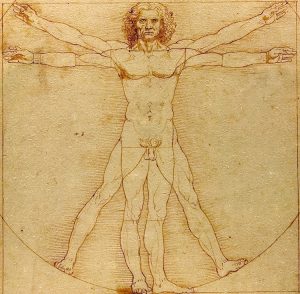
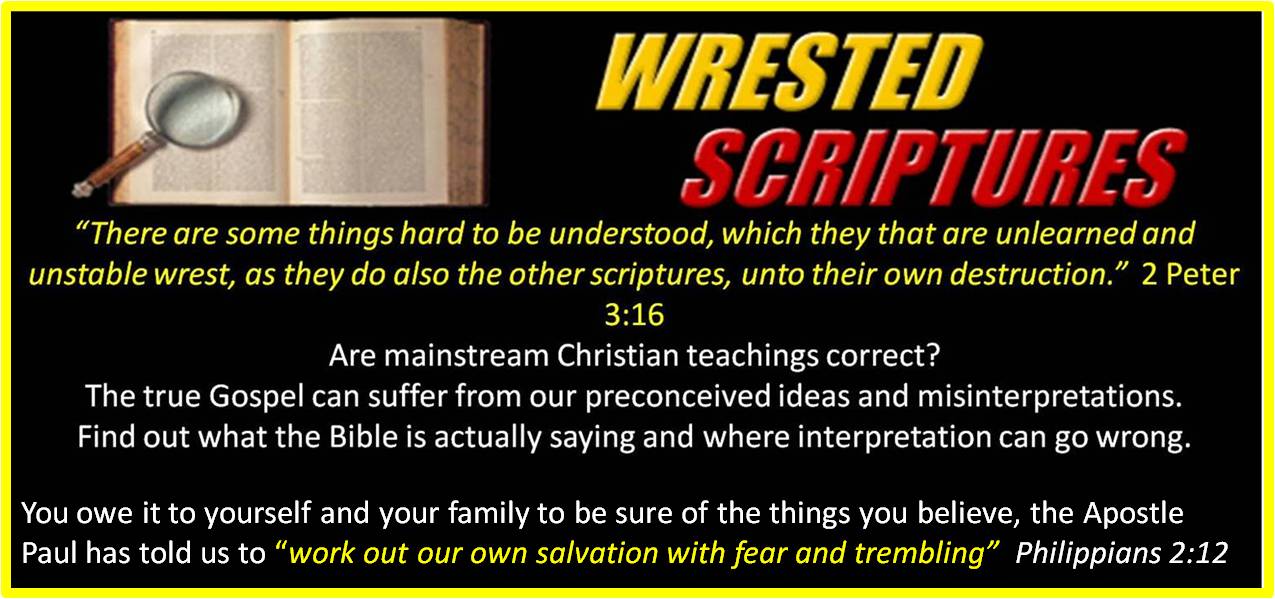

 someone who is alive and taking part in the affairs of human beings living on the earth. And, equally importantly, it is only in the New Testament that we read about the God of heaven being described over and over again as “Father”, a term which is extremely rare in the Old Testament Scriptures.
someone who is alive and taking part in the affairs of human beings living on the earth. And, equally importantly, it is only in the New Testament that we read about the God of heaven being described over and over again as “Father”, a term which is extremely rare in the Old Testament Scriptures.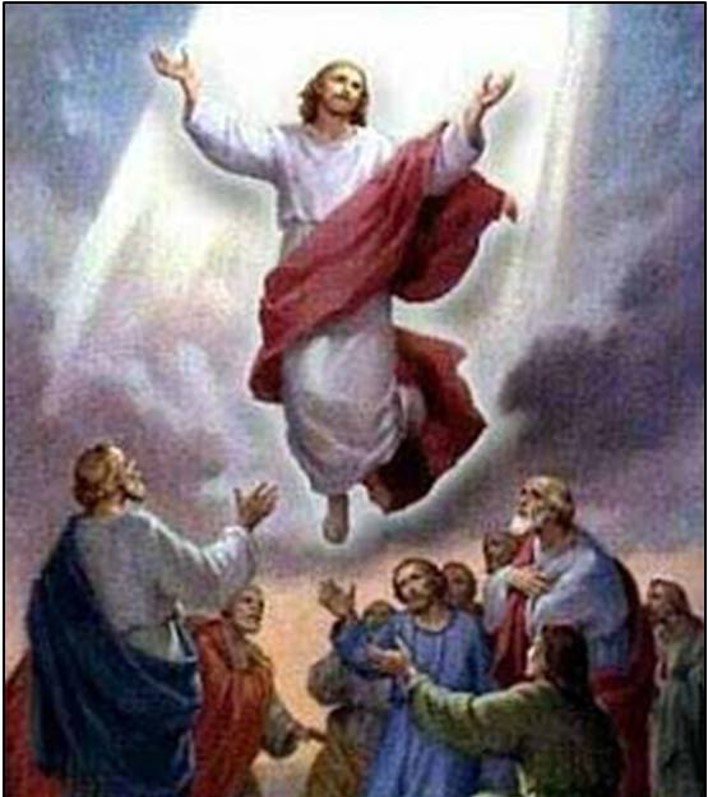
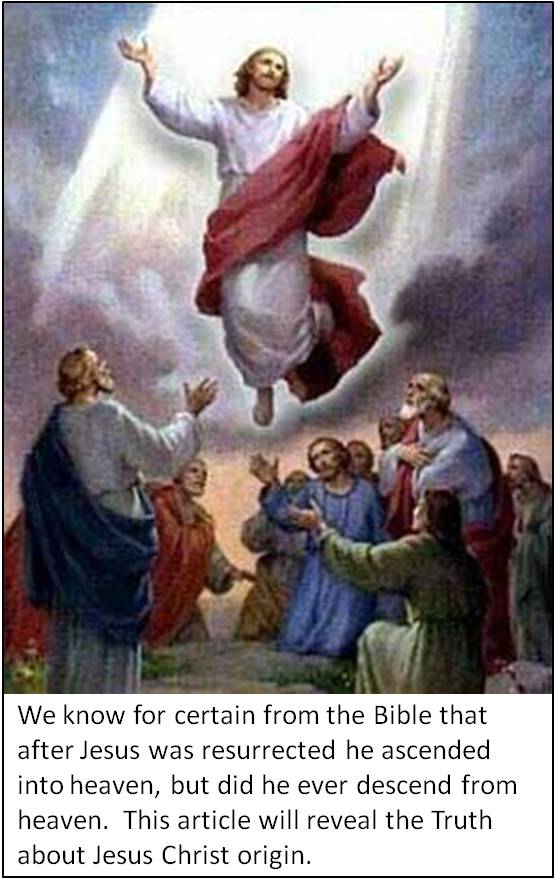

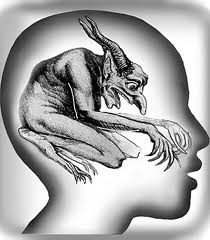
 Testament. In the Old Testament from Genesis right through to Malachi we do not find the problem of demons, devils and demon possession. The Old Testament is completely silent about these things. For 4000 years the Jews knew little about it.
Testament. In the Old Testament from Genesis right through to Malachi we do not find the problem of demons, devils and demon possession. The Old Testament is completely silent about these things. For 4000 years the Jews knew little about it.
 tombs that have survived from those eras – namely the belief in an afterlife. The Babylonians placed weapons and implements in their tombs to help the ‘spirit’ of their dead ones protect itself and be able to hunt on its way to the afterlife. The Egyptian “book of the dead” shows how that they believed that upon death the “Weighing of the Heart” judgment ceremony was performed before the god Osiris. This would determine if the one whose heart was being weighed was worthy of spending eternity in the fields of Hetep and Iaru. The Greeks also believed in an immortal soul. The teachings of Pluto declared that everyone had an “immortal soul” which, depending on how an individual had lived their life, would mean they would either spend an eternity of torture in Hades or Tartarus or spend their time in paradise in Elysian. The Romans also adopted the same doctrine as the Greeks. So the ancients then, believed in the immortality of the soul and an afterlife upon death.
tombs that have survived from those eras – namely the belief in an afterlife. The Babylonians placed weapons and implements in their tombs to help the ‘spirit’ of their dead ones protect itself and be able to hunt on its way to the afterlife. The Egyptian “book of the dead” shows how that they believed that upon death the “Weighing of the Heart” judgment ceremony was performed before the god Osiris. This would determine if the one whose heart was being weighed was worthy of spending eternity in the fields of Hetep and Iaru. The Greeks also believed in an immortal soul. The teachings of Pluto declared that everyone had an “immortal soul” which, depending on how an individual had lived their life, would mean they would either spend an eternity of torture in Hades or Tartarus or spend their time in paradise in Elysian. The Romans also adopted the same doctrine as the Greeks. So the ancients then, believed in the immortality of the soul and an afterlife upon death.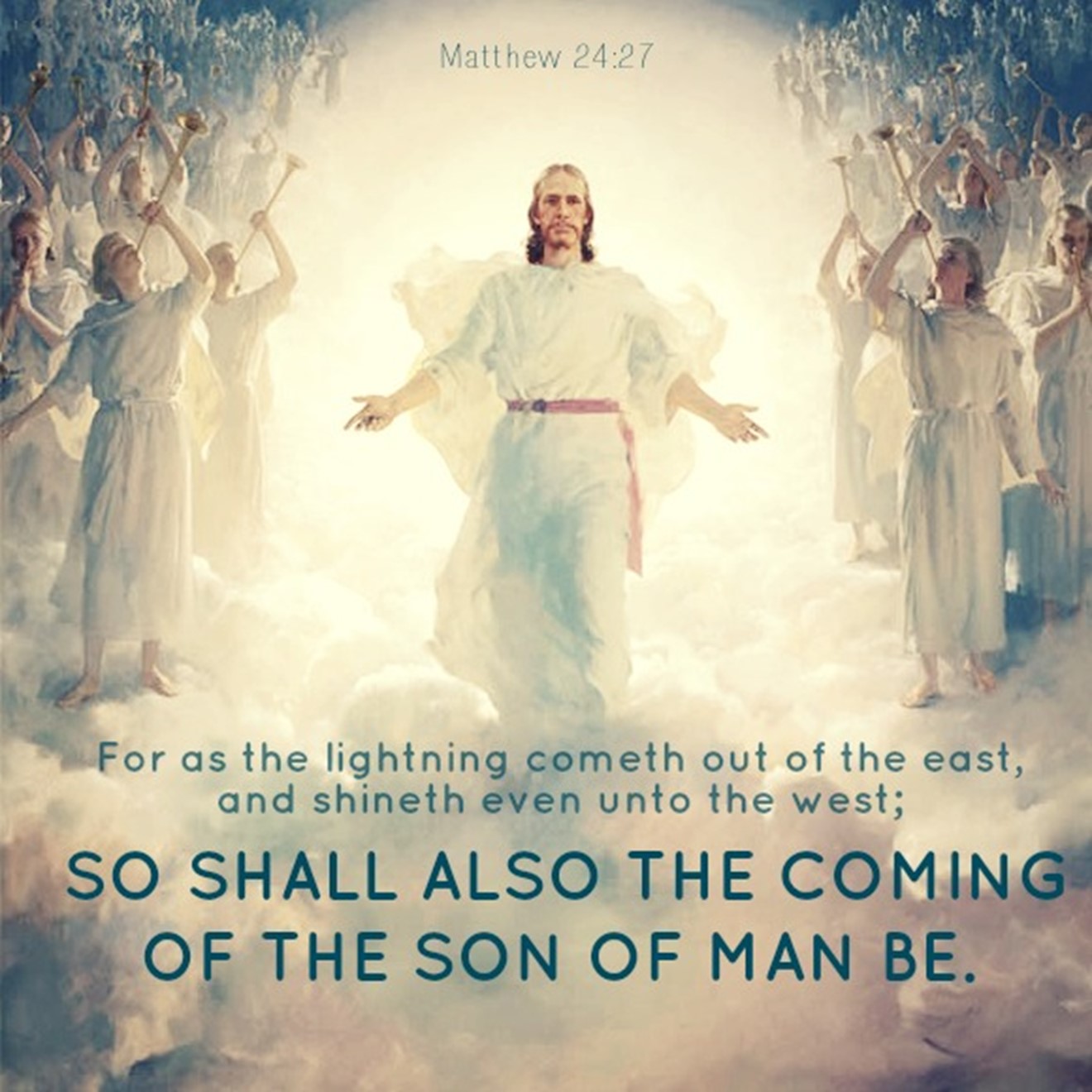
 True Bible Students have always taught that the Return of Jesus Christ to the earth is vital to the fulfillment of the purpose of God. This article reviews Bible teaching about the Second Coming, both the events that will lead up to that miracle and the reason for the Lord’s Return.
True Bible Students have always taught that the Return of Jesus Christ to the earth is vital to the fulfillment of the purpose of God. This article reviews Bible teaching about the Second Coming, both the events that will lead up to that miracle and the reason for the Lord’s Return.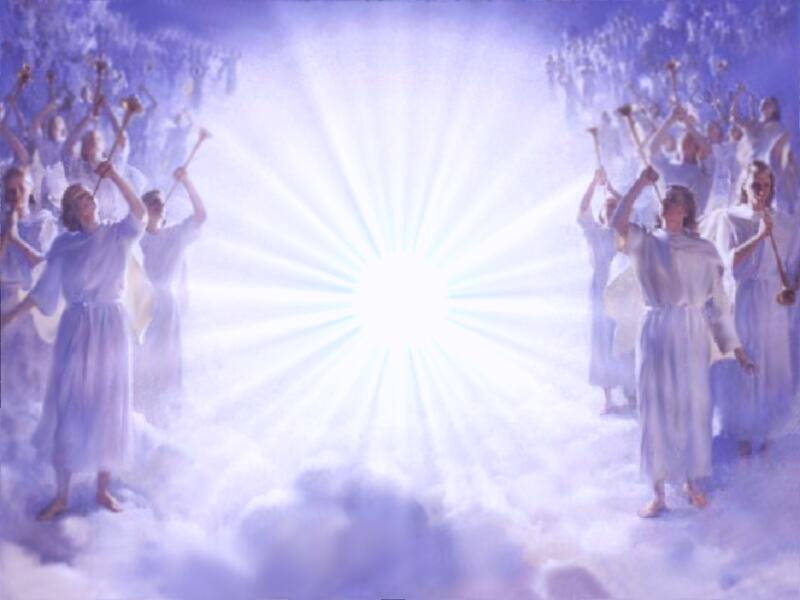
 Firstly let us look at the Hebrew and Greek words used for what appears in our Bible as the English word “angel”.
Firstly let us look at the Hebrew and Greek words used for what appears in our Bible as the English word “angel”. The Book of Revelation is a series of visions, seen and recorded by John, one of Jesus’ apostles. We saw in the last two issues how the book uses imagery to depict the history of the Roman Empire from its early phases through to its eventual fall. In this concluding article we find that history is now being viewed from a different perspective: a spiritual one.
The Book of Revelation is a series of visions, seen and recorded by John, one of Jesus’ apostles. We saw in the last two issues how the book uses imagery to depict the history of the Roman Empire from its early phases through to its eventual fall. In this concluding article we find that history is now being viewed from a different perspective: a spiritual one. led them to commit the first sin (Genesis 3:15).
led them to commit the first sin (Genesis 3:15). There were some who protested against this corruption. A tiny minority, they championed the true gospel as preached by the apostles, and they suffered in consequence. There is no intolerance like religious intolerance. As the centuries passed, they faced exclusion, imprisonment and death. The ousted pagan dragon is replaced in the next chapter by another composite beast, with seven heads, which has great power and we read:
There were some who protested against this corruption. A tiny minority, they championed the true gospel as preached by the apostles, and they suffered in consequence. There is no intolerance like religious intolerance. As the centuries passed, they faced exclusion, imprisonment and death. The ousted pagan dragon is replaced in the next chapter by another composite beast, with seven heads, which has great power and we read:
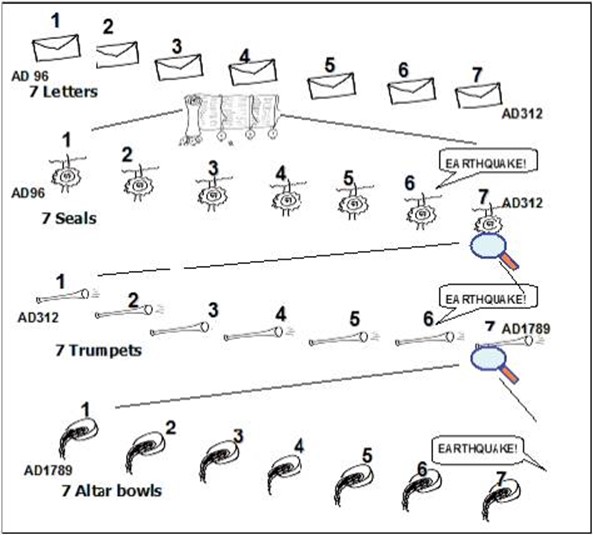 It is a surprise to find seven churches in the same area with such a variation in their spiritual health, from Ephesus – patiently enduring and bearing up for Jesus’ sake; to Laodicea – smug and complacent, but in Jesus’ view close to death (see Revelation 1:11 to 3:22).
It is a surprise to find seven churches in the same area with such a variation in their spiritual health, from Ephesus – patiently enduring and bearing up for Jesus’ sake; to Laodicea – smug and complacent, but in Jesus’ view close to death (see Revelation 1:11 to 3:22). with a warrior on his back. The next seal introduces a red horse ridden by a man with a dagger.
with a warrior on his back. The next seal introduces a red horse ridden by a man with a dagger.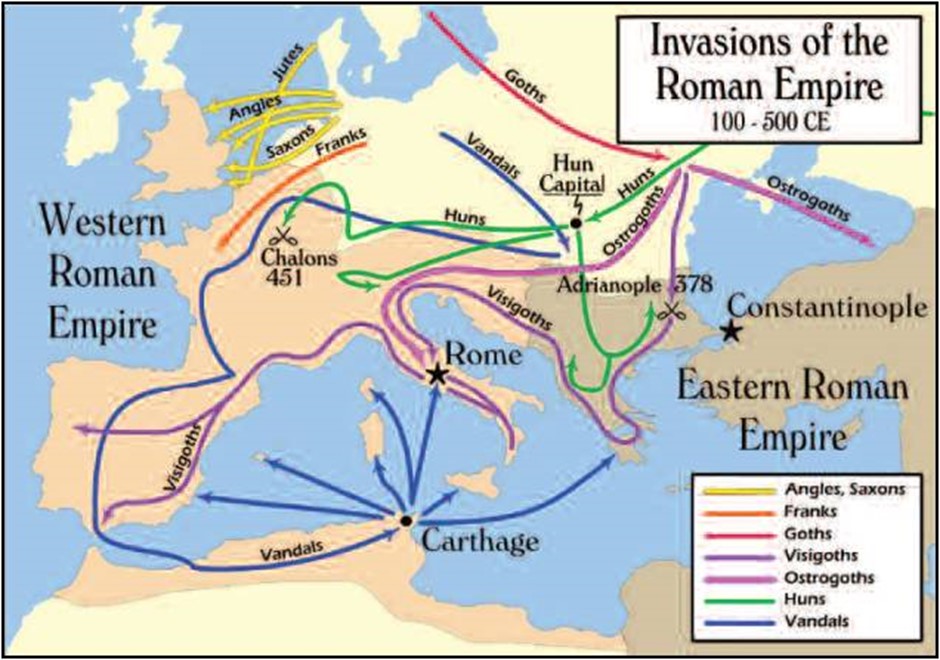
 other, heralding the next stages in history as these barbarians attack:
other, heralding the next stages in history as these barbarians attack:




